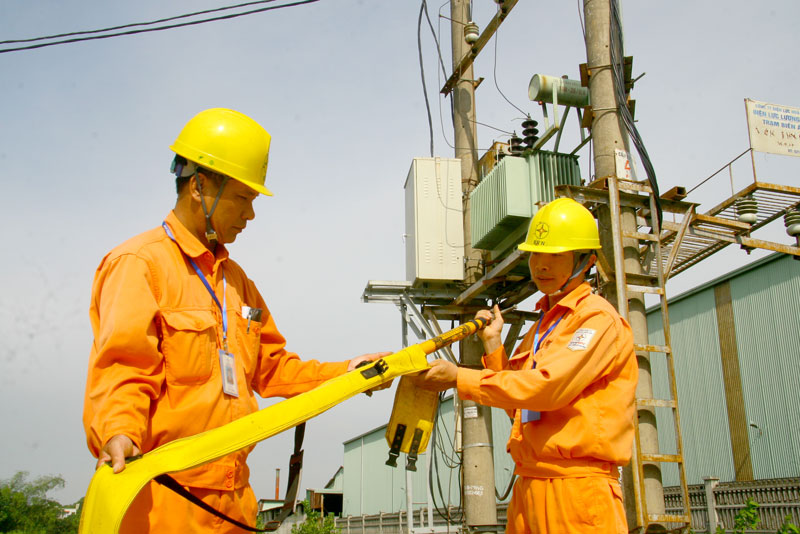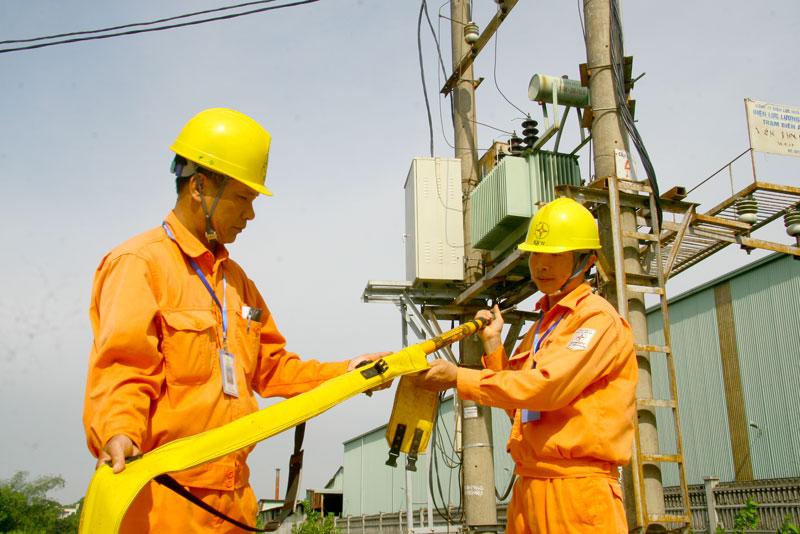
(HBO) – Hoa Binh province’s Luong Son district has mobilized all resources to give its rural villages a facelift. The district’s focus has been placed on building new-style rural communes and creating sustainable and comprehensive momentum for local socio-economic growth. Hundreds of billions of VND has been invested in new-style rural building in recent years.
 Luong Son district’s electricity sector has
invested in expanding power network, contributing to boosting the local
economic development.
Luong Son district’s electricity sector has
invested in expanding power network, contributing to boosting the local
economic development.
In the first half
of this year, the district
has raised over 208 billion VND to develop new-style rural villages, including
over 50 billion VND funded by the State budget and over 84 billion VND sourced from local budget. Private
firms also contributed close to 3 billion VND to the fund while about 44
billion VND was donated by locals.
Since the
district started building new-style rural areas, the local agriculture has seen
positive transformation, developing towards large-scale commercial production
that is sufficient to supply for Hanoi and surrounding areas. It has promoted farming of crops and animals
that are not only suitable to local soil and water conditions but also meet
market demands to create competitive advantages.
Being the
provincial hub of industry, Luong Son is making efforts to minimise industrial
activities that are harmful to the environment and to promote environmentally-friendly ones. The
movement, called "Clean house, beautiful garden, healthy environment, civilised
village”, has resulted effective outcomes.
So far, allthe 19 communes of the district have
fulfilled the 19 criteria set
for a new-style rural commune for the 2016 – 2020 period; 11 of which have
received recognition certificates from the Chairman of the provincial People’s Committee,
and the rest have
completed application for recognition and been waiting for the province’s
verification and approval.
By mid-June,
Luong Son has fulfilled seven out of the nine criteria needed forrecognition as a new-style district
and been striving to satisfy the remaining requirements regarding
transportation and healthcare.
According to leaders
of the district, to achieve the new-style rural district status at an
early date, the district will
continue mobilising resources to develop local infrastructure, improve
awareness of the campaign among the locals and step up economic links and expand production.
It aims to receive the award this year./.
According to data from the Hoa Binh Provincial Party Committee, the industrial production index for the first six months of 2025 is estimated to have increased by 20% compared to the same period last year. This marks the highest year-on-year growth rate for this period since 2020.
In the first six months of 2025, Hoa Binh province’s export turnover was estimated at 1.145 billion USD, marking an 18.11% increase compared to the same period in 2024. Import turnover was estimated at $ 804 million, a 17.15% increase, which helped the province maintain a positive trade balance.
The lives of the ethnic minority farmers in Tan Lac district have gradually improved thanks to the new directions in agricultural production. This is a testament to the collective strength fostered through the professional associations and groups implemented by various levels of the district’s Farmers’ Union.
With the motto the "product quality comes first,” after nearly one year of establishment and operation, Muong village’s Clean Food Agricultural and Commercial Cooperative, located in Cau Hamlet, Hung Son Commune (Kim Boi district), has launched reputable, high-quality agricultural products to the market that are well-received by consumers. The products such as Muong village’s pork sausage, salt-cured chicken, and salt-cured pork hocks have gradually carved out a place in the market and they are on the path to obtaining the OCOP certification.
In the past, the phrase "bumper harvest, rock-bottom prices" was a familiar refrain for Vietnamese farmers engaged in fragmented, small-scale agriculture. But today, a new spirit is emerging across rural areas of Hoa Binh province - one of collaboration, organisation, and collective economic models that provide a stable foundation for production.
Maintaining growing area codes and packing facility codes in accordance with regulations is a mandatory requirement for agricultural products to be eligible for export. Recently, the Department of Agriculture and Environment of Hoa Binh province has intensified technical supervision of designated farming areas and packing facilities to safeguard the "green passport" that enables its products to access international markets.



 Luong Son district’s electricity sector has
invested in expanding power network, contributing to boosting the local
economic development.
Luong Son district’s electricity sector has
invested in expanding power network, contributing to boosting the local
economic development.